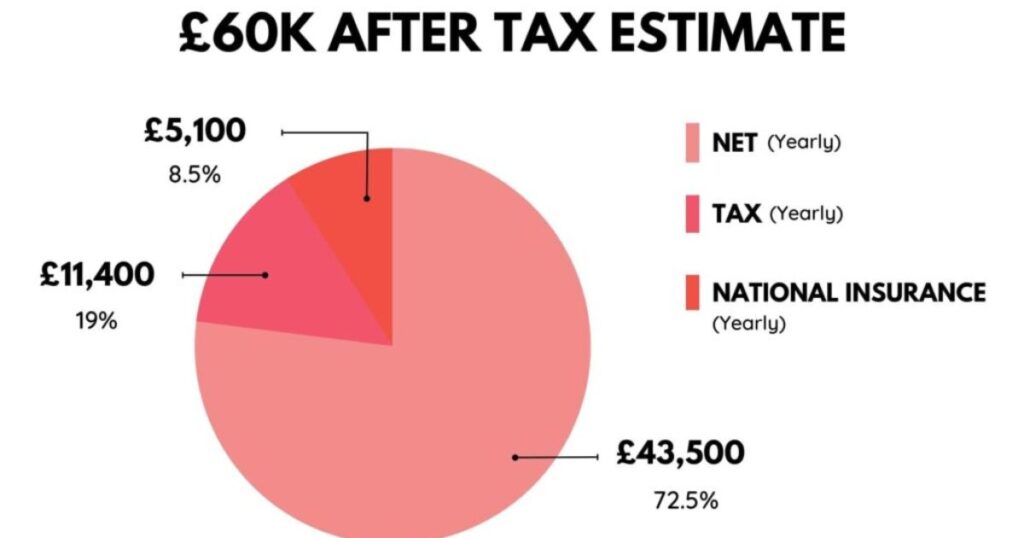Are you making $60,000 a year? Preparing to file your taxes? It’s important to understand your tax responsibilities, for this income level before you begin. Knowing this information can assist you in optimizing your tax return and potentially reducing your expenses. Therefore take some time to determine your income tax rate and duties prior to submitting your taxes.
What is the monthly and biweekly take home pay after taxes, for a salary of $60,000 [2024]?
If you earn $60,000 annually it’s essential to be aware of the income tax amount you are required to contribute.
Planning in advance and calculating the income tax rate on a salary of $60,000 can aid you in navigating the tax filing process. Though assessing what you owe may seem daunting, our blog offers a breakdown to assist you in determining this year’s tax payment amount.
Overview Of Biweekly After Taxes
Earning $60,000 annually requires understanding the post-tax breakdown to manage finances effectively. After taxes, this translates to approximately $3,517.50 per month and about $1,623.46 biweekly. Knowing these figures helps individuals plan budgets and make informed financial decisions throughout the year.
With careful consideration of tax withholdings and deductions, individuals can optimize their take-home pay and ensure financial stability. This understanding empowers earners to navigate their financial responsibilities with confidence and clarity, fostering a sense of financial well-being and security.
60k A Year Is How Much A Month After Taxes

Earning $60,000 annually translates to approximately $3,517.50 per month after taxes. This estimation considers federal and state tax withholdings, as well as FICA contributions for Social Security and Medicare. After accounting for these deductions, the net monthly income reflects the take-home pay available for expenses and savings.
Don’t miss to read out this blog: How to cancel OnlyFans subscription in easy steps?
Understanding this breakdown is vital for effective budgeting and financial planning. It’s essential to stay informed about tax obligations to manage finances efficiently and make informed decisions. Overall, knowing the after-tax monthly income on a $60,000 salary empowers individuals to navigate their financial responsibilities with confidence.
Federal Income Tax
Federal Income Tax is the portion of your earnings that goes to the government to fund various federal programs and services. It’s calculated based on your income level, with higher earners typically paying a higher percentage.
This tax is collected annually and helps support essential services like national defense, healthcare, and infrastructure. Understanding your federal tax obligations is crucial for financial planning and compliance with tax laws. It’s important to stay informed about potential deductions and credits to minimize your tax burden legally.
State Income Tax
State income tax is a levy imposed by state governments on individuals’ earnings within their jurisdiction. It functions independently of federal income tax and varies widely from state to state. The rates are determined by state legislation and can differ based on income brackets and filing status.
State income tax revenue contributes to funding state government operations and services, such as education, healthcare, and infrastructure. Taxpayers must file separate state income tax returns in addition to federal returns to comply with state tax laws.
Social Security
Social Security is a vital social insurance program in the United States, providing financial support to retired, disabled, widowed, and financially dependent individuals. Funded through payroll taxes, it offers economic protection by ensuring a steady income stream during retirement years or in case of disability.
With its widespread impact, Social Security plays a crucial role in maintaining financial stability and alleviating poverty among vulnerable populations. It stands as a cornerstone of the nation’s social safety net, offering peace of mind and security to millions of Americans across generations.
Medicare

Medicare, a vital program in the United States, provides health insurance coverage primarily to individuals aged 65 and older. Funded through taxes, it offers essential medical services, including hospital stays, preventive care, and prescription drugs.
Its aim is to ensure access to healthcare for seniors and certain younger individuals with disabilities. Medicare operates in different parts, each covering specific services, offering flexibility and comprehensive coverage tailored to individual needs.
60k a year is how much biweekly after taxes
Earning $60,000 annually equates to approximately $2,307.69 biweekly after taxes. This amount reflects deductions for federal taxes, averaging around $508.71, and FICA taxes, approximately $175.66.
After these deductions, the net biweekly pay stands at roughly $1,623.46. This calculation assumes a standard workweek of 40 hours and 26 bi-weeks in a year, totaling 1,040 work hours annually. Please note that individual circumstances and tax regulations may cause slight variations in these figures.
$60,000 Income Tax Calculator
The $60,000 Income Tax Calculator swiftly computes your tax liability, ensuring financial clarity. It accurately breaks down federal and state taxes, Social Security, Medicare, and other deductions.
With a user-friendly interface, it offers precise estimates for informed financial planning. Its efficiency saves time and facilitates strategic tax optimization, empowering individuals to make informed decisions. Utilize this tool to navigate tax obligations confidently and maximize your financial well-being.
60k a year is how much biweekly
Earning $60,000 annually equates to approximately $2,307.69 biweekly after taxes, based on a standard work schedule. After federal tax withholding of around $508.71 and FICA taxes of approximately $175.66 per biweek, the net pay amounts to roughly $1,623.46.
Also Read This Blog: wellhealthorganic.com/know-the-causes-of-white-hair-and-easy-ways-to-prevent-it-naturally
These calculations provide a snapshot of the biweekly take-home income for someone earning $60,000 per year, highlighting the impact of tax deductions on their paycheck.
$60,000 After-Tax Income By State And Filing Status [Table]
![$60,000 After-Tax Income By State And Filing Status [Table]](https://filterabout.com/wp-content/uploads/2024/04/dollar60000_after_tax_income_by_state_and_filing_status_table-1024x538.jpg)
The table detailing $60,000 after-tax income by state and filing status provides a concise snapshot of net earnings across different regions and marital statuses. It highlights variations in take-home pay based on state tax rates and filing statuses such as single, married filing jointly, and head of household.
This resource empowers individuals to make informed financial decisions by showcasing the impact of taxes on their annual income. By presenting clear comparisons, it aids in understanding the financial implications of residency and filing status choices.
| State | Filing Status – Single | Filing Status – Married Filing Jointly | Filing Status – Head of Household |
| Alabama | $51,272 | $53,944 | $53,046 |
| Alaska | $54,032 | $56,319 | $55,421 |
| Arizona | $52,669 | $55,436 | $54,538 |
| Arkansas | $51,067 | $53,475 | $52,577 |
| California | $51,829 | $55,384 | $54,486 |
| Colorado | $51,891 | $54,768 | $53,870 |
| Connecticut | $51,982 | $54,919 | $54,021 |
| Delaware | $51,275 | $53,749 | $52,851 |
| Florida | $54,032 | $56,319 | $55,421 |
| Georgia | $51,174 | $53,875 | $52,977 |
| Hawaii | $50,105 | $53,208 | $52,310 |
| Idaho | $51,432 | $54,718 | $53,820 |
| Illinois | $51,180 | $53,584 | $52,686 |
| Indiana | $52,127 | $54,446 | $53,548 |
| Iowa | $50,972 | $53,503 | $52,605 |
| Kansas | $51,397 | $55,400 | $54,502 |
| Kentucky | $51,207 | $53,719 | $52,821 |
| Louisiana | $52,255 | $54,947 | $54,049 |
| Maine | $51,375 | $54,858 | $53,960 |
| Maryland | $51,498 | $54,049 | $53,151 |
| Massachusetts | $51,252 | $53,759 | $52,861 |
| Michigan | $51,695 | $54,194 | $53,296 |
| Minnesota | $51,237 | $54,489 | $53,591 |
| Mississippi | $51,747 | $54,449 | $53,551 |
| Missouri | $51,680 | $54,666 | $53,768 |
| Montana | $51,053 | $53,840 | $52,942 |
| Nebraska | $51,383 | $54,714 | $53,816 |
| Nevada | $54,032 | $56,319 | $55,421 |
| New Hampshire | $54,032 | $56,319 | $55,421 |
| New Jersey | $52,264 | $55,318 | $54,420 |
| New Mexico | $52,006 | $55,056 | $54,158 |
| New York | $51,204 | $56,178 | $53,280 |
| North Carolina | $51,674 | $54,598 | $53,700 |
| North Dakota | $53,068 | $55,944 | $55,046 |
| Ohio | $53,068 | $55,432 | $54,534 |
| Oklahoma | $51,720 | $54,522 | $53,624 |
| Oregon | $49,270 | $52,045 | $51,147 |
| Pennsylvania | $52,190 | $54,477 | $53,579 |
| Rhode Island | $52,294 | $55,093 | $54,195 |
| South Carolina | $51,284 | $54,477 | $53,579 |
| South Dakota | $54,032 | $56,319 | $55,421 |
| Tennessee | $54,032 | $56,319 | $55,421 |
| Texas | $54,032 | $56,319 | $55,421 |
| Utah | $51,101 | $53,426 | $52,528 |
| Vermont | $52,109 | $55,026 | $54,128 |
| Virginia | $51,152 | $53,751 | $52,853 |
| Washington | $54,032 | $56,319 | $55,421 |
| Washington, D.C | $51,374 | $54,473 | $53,575 |
| West Virginia | $51,377 | $53,784 | $52,886 |
| Wisconsin | $51,822 | $54,780 | $53,882 |
| Wyoming | $54,032 | $56,319 | $55,421 |
How To Calculate Tax, Medicare, And Social Security On A $60000 Salary In The Us?

To calculate taxes, Medicare, and Social Security on a $60,000 salary in the US, first determine federal and state tax rates. Then, subtract state and federal taxes along with Social Security and Medicare contributions from the salary.
Federal tax may range around $5,968, state tax approximately $2,864, Social Security about $3,720, and Medicare roughly $870. Finally, add up these deductions to find the total tax burden, leaving you with a net pay of around $46,240 annually.
60000 A Year Is How Much An Hour?
Earning $60,000 per year equates to approximately $28.85 per hour after taxes, based on a standard workweek of 40 hours and 52 weeks in a year. This hourly rate considers deductions for federal and FICA taxes, providing an estimate of take-home pay.
It’s crucial to recognize that this figure varies depending on individual tax circumstances and any additional deductions or contributions. Understanding the hourly breakdown of an annual salary aids in financial planning and budgeting for both short-term and long-term goals.
60k a year is how much biweekly
Earning $60,000 annually translates to approximately $2,307.69 every two weeks after taxes. This biweekly amount factors in federal tax withholding, estimated at around $508.71, along with FICA taxes such as Social Security and Medicare, totaling approximately $175.66.
Comprehensive Guidance For This Blog: Rajkotupdates.news Watchgpt App Apple Watch Users
After deductions, your net biweekly pay amounts to roughly $1,623.46. These figures are based on a standard workweek of 40 hours and 26 biweekly pay periods in a year, providing a clear snapshot of your take-home income on a regular basis.
60k a year is how much a month after taxes
Earning $60,000 annually translates to around $3,517.50 per month after taxes. This calculation considers federal tax withholding and FICA taxes, providing a clear snapshot of net monthly income.
With a standard workweek and yearly hours factored in, this estimate offers a concise understanding of take-home pay. It’s essential to recognize that individual circumstances may influence actual amounts. Nonetheless, this breakdown serves as a helpful guide for financial planning and budgeting purposes.
60k A Year Is How Much Biweekly After Taxes?
If you earn $60,000 annually, understanding your biweekly take-home pay after taxes is essential. After factoring in federal and state income taxes, as well as deductions for Social Security and Medicare, your biweekly net pay is approximately $1,623.46.
This amount is calculated based on a standard workweek of 40 hours and 26 biweekly pay periods in a year. Knowing your biweekly income helps in budgeting and financial planning, ensuring you have a clear understanding of your regular cash flow.
Gross Pay V/S Net Pay On $60,000 Annual Income
In the realm of a $60,000 annual income, the dichotomy between gross pay and net pay is stark. At face value, the gross pay may seem enticing, standing at $60,000 per year. However, once taxes and deductions come into play, the net pay reveals the true amount that finds its way into your pocket.
After factoring in federal and state taxes, Medicare, and Social Security, the net pay dwindles to $46,240 per year, showcasing the disparity between what you earn and what you take home. This stark contrast underscores the importance of understanding the impact of taxes on your overall income.
What Is Income Tax On A Salary Of $60000 Annual V/S Monthly?
Income tax on a $60,000 annual salary versus monthly earnings varies due to different tax withholding methods. Annually, federal and state taxes, Social Security, and Medicare are calculated based on the entire yearly income. Monthly, taxes are proportionally deducted from the monthly salary, resulting in a different withholding amount.
Tax liability remains the same, the distribution differs depending on the frequency of payment, impacting cash flow and budgeting strategies. Understanding these differences is crucial for effective financial planning and tax management throughout the year.
| Withholding | Annual | Monthly |
| Salary | $60,000 | $5,000 |
| Federal Income Tax | $5,968 | $497 |
| State Income Tax | $2,864 | $239 |
| Social Security | $3,720 | $310 |
| Medicare | $870 | $72.50 |
| SDI (State Disability Insurance) | $31.20 | $2.60 |
| FLI (Family Leave Insurance) | $307 | $25.55 |
| Total tax | $13,760 | $1,147 |
| Net pay | $46,240* | $3,853 |
| Marginal tax rate | 36.0% | 36.0% |
| Average tax rate | 22.9% | 22.9% |
60k a year is how much a month after taxes
Earning $60,000 annually translates to roughly $5,000 per month after taxes. This calculation considers federal and state tax withholdings, as well as deductions for Social Security and Medicare. After these deductions, the net monthly income stands at approximately $3,517.50.
Understanding these figures is crucial for effective financial planning and budgeting. It’s important to remember that individual circumstances and tax laws may affect the actual amount received.
What Is The Tax Rate On $60000 Income?
The tax rate on a $60,000 income varies based on factors like filing status and location. However, for New York, the marginal tax rate stands at 36.0%, while the average tax rate is 22.9%. These rates reflect the percentage of income taxed, with marginal tax applied to each level of earnings and average tax indicating overall tax burden.
Understanding these rates aids in financial planning and optimizing tax strategies to maximize returns. It’s essential to stay informed about regional tax laws and changes to make informed decisions regarding income management.
Conclusion
Understanding the implications of a $60,000 annual income on monthly and biweekly pay after taxes is crucial for effective financial planning. With careful consideration of tax rates and deductions, individuals can optimize their earnings and manage their finances more efficiently, 60k a year.
By staying informed about tax regulations and utilizing available resources, such as tax calculators and professional advice, individuals can make informed decisions to maximize their take-home pay and achieve their financial goals.
Also Know The After Tax For Various Salary Ranges
Explore the after-tax earnings across diverse salary brackets, offering insights into net incomes at varying income levels. Delve into the financial landscape with clarity, unveiling the impact of taxes on different salary ranges. Gain a comprehensive understanding of post-tax earnings, empowering informed financial decisions.
FAQ’s
$60,000 A Year Is How Much A Month After Taxes
After taxes, $60,000 annually roughly equals $3,517.50 per month, providing a clear perspective on monthly take-home pay.
$60,000 A Year Is How Much A Day
Earning $60,000 annually equates to approximately $230.77 per day after taxes, shaping daily financial perspectives.
More FAQ’s
How Much Do I Make Biweekly If I Make 60k A Year?
If you earn $60k annually, expect approximately $1,623 biweekly after taxes, based on standard deductions and withholdings.
What Are The Tax Bracket For 2024?
In 2024, tax brackets vary depending on income, with rates ranging from 10% to 37%, influencing the amount owed to the government.
How Much Federal Tax Should I Pay On $60 000?
On a $60,000 salary, expect to pay approximately $5,968 in federal taxes, ensuring compliance with IRS regulations.
How Much Is 60000 A Year Per Hour After Taxes?
$28.85 per hour after taxes, based on a standard workweek of 40 hours and 52 weeks per year.

Alexander Quinn is the author behind Filterabout.com. Known for expertise in diverse topics, Quinn’s content on the website reflects a versatile knowledge base catering to various interests.
![60k a year is how much a month & biweekly after taxes [2024]](https://filterabout.com/wp-content/uploads/2024/04/60k_a_year_is_how_much_a_month_and_biweekly_after_taxes_2024.jpg)


![Jynxzi Age, Net Worth, Career[2024]](https://filterabout.com/wp-content/uploads/2024/05/Who-Is-Shanin-Blake-Age-Wiki-Parents-Dating-Net-Worth-300x148.jpg)
![Jynxzi Age, Net Worth, Career[2024]](https://filterabout.com/wp-content/uploads/2024/05/Jynxzi-Age-Net-Worth-Career2024-300x148.jpg)


![Kutty Surumi Net Worth, Bio, Age[2024]](https://filterabout.com/wp-content/uploads/2024/05/Kutty-Surumi-Net-Worth-Bio-Age2024-300x148.jpg)



![Jynxzi Age, Net Worth, Career[2024]](https://filterabout.com/wp-content/uploads/2024/05/Who-Is-Shanin-Blake-Age-Wiki-Parents-Dating-Net-Worth-150x150.jpg)